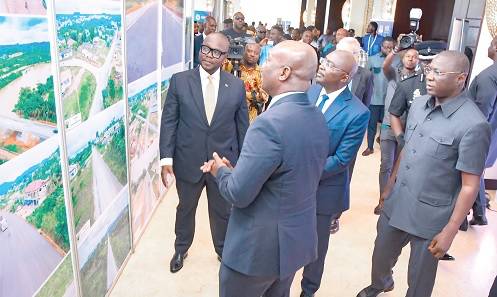Paving Ghana’s Future: A $271 Billion Road to 2047
•
•
•
•
•
•
•
Ghana Infrastructure Plan to increase its road network will require an estimated $271.7 billion over the next few decades.
Ghana is poised for a transformative expansion of its road infrastructure, with an ambitious goal of increasing its road network from 78,401 kilometers in 2016 to 253,000 kilometers by 2047. This bold target is part of the Ghana Infrastructure Plan and will require an estimated $271.7 billion over the next few decades. A significant portion of the plan aims to boost the proportion of paved roads to 70% while connecting urban centers with multi-lane highways and constructing long-span bridges across critical waterways like the Volta Lake.
Speaking at a recent forum in Accra on road financing, the Minister of Finance, Mohammed Amin Adam, emphasized the scale of investment required to achieve these goals. According to him, the country needs to allocate approximately $9 billion annually towards this ambitious infrastructure expansion. On top of that, an additional $1.3 billion per year will be necessary for the maintenance and improvement of existing roads. These figures underscore the monumental task ahead, which the minister acknowledged as both challenging and urgent, especially given Ghana’s population growth rate of about 2% per year.
Since January 2024, the government has invested about GH¢10 billion (around $660 million) into the road sector, with plans for an additional GH¢7.6 billion (approximately $509 million) in the pipeline. However, Dr. Amin Adam stressed that public funding alone would not suffice to bridge the infrastructure gap. To meet the targets laid out in the Ghana Infrastructure Plan 2018-2047, the government is adopting a coordinated and integrated approach to infrastructure delivery, aiming to create a more guided framework that addresses the country's long-standing challenges.
In line with this strategy, the government has launched key initiatives like the District Road Improvement Programme (DRIP) and the upcoming Economic Roads Improvement Initiative. These programs are designed to prioritize funding for roads that link essential economic areas, such as agricultural zones and tourist sites, thereby enhancing productivity and growth in these regions.
Despite these efforts, the minister highlighted that private sector involvement would be crucial to achieving the nation’s infrastructure goals. He praised the Ghana Highway Authority (GHA) for its dedication to quality road infrastructure but also pointed out the need for a more streamlined process from feasibility studies to project implementation. According to Dr. Amin Adam, the time has come for the country to embrace a different approach, one that makes substantial room for private-sector participation. He assured that the government would work to ensure that investors are adequately supported to deliver a series of “bankable” projects without unnecessary bureaucratic hurdles.
One innovative solution the minister proposed is leveraging pension funds as a more predictable source of financing. With pension assets under management reaching nearly GH¢50 billion last year, Dr. Amin Adam indicated that the government is exploring ways to involve these funds in co-investing in commercially viable infrastructure projects that promise stable returns on investment.
Additionally, he mentioned the development of a revised framework for road and bridge tolls by 2025. This measure is intended to mitigate commercial risks, making it more attractive for pension funds and private financing pools to participate in the country’s road and infrastructure programs.
At the same forum, Robert Taliercio O’Brien, the Country Director of the World Bank, noted Ghana's significant progress in road infrastructure development. He acknowledged that Ghana has the second-largest road pipeline in the sub-region and ranks 38th globally in terms of the US dollar value of all projects. While commending the nation’s achievements, he also pointed out ongoing challenges, particularly related to macroeconomic factors that have hampered the completion of some road projects.
This ambitious plan, if realized, could fundamentally reshape Ghana’s infrastructure landscape, enhancing connectivity and fostering economic growth across the nation. However, it will require not just substantial financial investment but also innovative strategies and strong collaboration between the public and private sectors.


